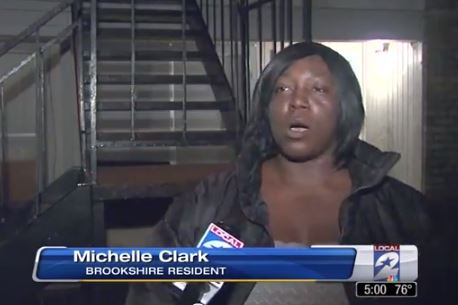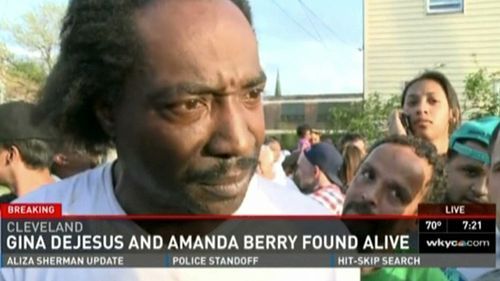Photo

SOAD is back! For more details on the event, click here.
3 notes
·
View notes
Video
New Slaves (Live on SNL) | Kanye West
322 notes
·
View notes
Photo




The troubling viral trend of the “hilarious” Black poor person
May 7, 2013
Charles Ramsey, the man who helped rescue three Cleveland women presumed dead after going missing a decade ago, has become an instant Internet meme. It’s hardly surprising—the interviews he gave yesterday provide plenty of fodder for a viral video, including memorable soundbites (“I was eatin’ my McDonald’s”) and lots of enthusiastic gestures. But as Miles Klee and Connor Simpson have noted, Ramsey’s heroism is quickly being overshadowed by the public’s desire to laugh at and autotune his story, and that’s a shame. Ramsey has become the latest in a fairly recent trend of “hilarious” black neighbors, unwitting Internet celebrities whose appeal seems rooted in a “colorful” style that is always immediately recognizable as poor or working-class.
Before Ramsey, there was Antoine Dodson, who saved his younger sister from an intruder, only to wind up famous for his flamboyant recounting of the story to a reporter. Since Dodson’s rise to fame, there have been others: Sweet Brown, a woman who barely escaped her apartment complex during a fire last year, and Michelle Clarke, who couldn’t fathom the hailstorm that rained down in her hometown of Houston, and in turn became “the next Sweet Brown.”
Granted, the buzzworthy tactic of reporters interviewing the most loquacious witnesses to a crime or other event is nothing new, and YouTube has countless examples of people of all ethnicities saying ridiculous things. One woman, for instance, saw fit to casually mention her breasts while discussing a local accident, while another man described a car crash with theatrical flair. Earlier this year, a “hatchet-wielding hitchhiker” named Kai matched Dodson’s fame with his astonishing account of rescuing a woman from a racist attacker. But none of those people have been subjected to quite the same level of derisive memeification as Brown, Clark, and now, perhaps, Ramsey—the inescapable echoes of “Hide yo’ kids, hide yo’ wife!” and “Kabooyaw,” the tens of millions of YouTube hits and cameos in other viral videos, even commercials.
It’s difficult to watch these videos and not sense that their popularity has something to do with a persistent, if unconscious, desire to see black people perform. Even before the genuinely heroic Ramsey came along, some viewers had expressed concern that the laughter directed at people like Sweet Brown plays into the most basic stereotyping of blacks as simple-minded ramblers living in the “ghetto,” socially out of step with the rest of educated America. Black or white, seeing Clark and Dodson merely as funny instances of random poor people talking nonsense is disrespectful at best. And shushing away the question of race seems like wishful thinking.
Ramsey is particularly striking in this regard, since, for a moment at least, he put the issue of race front and center himself. Describing the rescue of Amanda Berry and her fellow captives, he says, “I knew something was wrong when a little pretty white girl ran into a black man’s arms. Something is wrong here. Dead giveaway!”
The candid statement seems to catch the reporter off guard; he ends the interview shortly afterward. And it’s notable that among the many memorable things Ramsey said on camera, this one has gotten less meme-attention than most. Those who are simply having fun with the footage of Ramsey might pause for a second to actually listen to the man. He clearly knows a thing or two about the way racism prevents us from seeing each other as people.
Source
Now that you know this is a thing, please stop sharing these memes. Poor Black people speaking candidly about various serious incidents isn’t a hilarious joke.
31K notes
·
View notes
Quote
I will give you an example of how race affects my life. I live in a place called Alpine, New Jersey. Live in Alpine, New Jersey, right? My house costs millions of dollars. In my neighborhood, there are four black people. Hundreds of houses, four black people. Who are these black people? Well, there’s me, Mary J. Blige, Jay-Z and Eddie Murphy. Only black people in the whole neighborhood. So let’s break it down, let’s break it down: me, I’m a decent comedian. I’m a’ight. Mary J. Blige, one of the greatest R&B singers to ever walk the Earth. Jay-Z, one of the greatest rappers to ever live. Eddie Murphy, one of the funniest actors to ever, ever do it. Do you know what the white man who lives next door to me does for a living? He’s a fucking dentist! He ain’t the best dentist in the world…he ain’t going to the dental hall of fame…he don’t get plaques for getting rid of plaque. He’s just a yank-your-tooth-out dentist. See, the black man gotta fly to get to somethin’ the white man can walk to.
Chris Rock
7K notes
·
View notes
Photo



Musical Duo THEESatisfaction Makes Their Mark
The funk-psychedelic feministas speak about blending politics and art
EBONY: In an interview with The Quietus, Stas said, “Being weird, being called ‘weirdoes’ and ‘queerdoes’ and all kinds of things…It’s something we embrace.” What advice would you give to young queer Black women coming of age today and struggling to embrace their identity?
Stas: It takes time to come into your own and to know truly who you really are. I’m hopeful that the labels and branding of sexuality will soon fade. I think a struggling, young Black queer women should find creative ways to express themselves. Heteronormative society makes it difficult for us to feel comfortable at times.
—Patrice Peck
Read the rest of the interview at EBONY
137 notes
·
View notes
Video
youtube
Black Girl In Suburbia (documentary trailer)
Black Girl In Suburbia is a feature documentary that looks into the experiences of Black girls growing up in predominately white communities. This is a different look into suburbia from the perspective of women of color. This film explores through professional and personal interviews the conflict and issues Black girls have relating to both white and Black communities.
Black Girl In Suburbia intends to spark an open dialogue about race, identity, and perspective among all people, in hopes that these discussions will allow us to reconsider perceptions of ourselves, others and the communities in which we live and share.
Release date 2014
http://www.blackgirlinsuburbia.com
Your support is appreciated!
https://www.facebook.com/pages/Black-…
8K notes
·
View notes
Text
Hello All:
Here is a link to a piece that I was ‘required’ to release immediately, by virtue of the impending legal deadline. I love being able to reach people directly, but in an ideal scenario, I would not have to rush the release of new music… but the message is still there. In light of Wednesday’s tragic loss (of former label mate Chris Kelly), I am even more pressed to YELL this to a multitude that may not understand the cost of allowing today’s unhealthy paradigms to remain unchecked!
- MLH
CLICK IMAGE FOR iTUNES LINK

867 notes
·
View notes
Quote
“Rap music is so diverse in its themes, its style, its content but when it becomes a vehicle to be talked about in mainstream news, the rap that gets in national news is always the rap music that perpetuates misogyny that is most obscene in its lyrics and then this comes to stand for what rap is. Really its for me the perfect paradigm of colonialism, that is to say, we think of rap music as a little third-world country, that young white consumers are able to go to and take out of it whatever they want. We would have to acknowledge that what young white consumers, primarily male, oftentimes suburban, most got energized by in rap music was misogyny, obscenity, pugilistic eroticism and therefore that form of rap began to make the largest sums of money.”
bell hooks
406 notes
·
View notes
Quote
I asked a young White woman why she was studying social anthropology. She replied that she was hoping to go to Zimbabwe, and felt that she could help women there by advising them how to organize. The Black women in the audience gasped in astonishment. Here was someone scarcely past girlhood, who had just started university and had never fought a war in her life. She was planning to go to Africa to teach female veterans of a liberation struggle how to organize! This is the kind of arrogant, if not absurd attitude we encounter repeatedly. It makes one think: Better the distant armchair anthropologists than these ‘sisters’.
African feminist Ifi Amadiume
75K notes
·
View notes
Quote
“If you are getting a colonial education, you are learning how to solve imperial problems, not people’s problems.”
Hatem Bazian
2K notes
·
View notes
Photo

New Hampshire House Votes To Prohibit Private Prisons (March 22, 2013)
New Hampshire also rejected all private prison bids.
Let’s end mass incarceration and the prison industrial complex!
image source
85 notes
·
View notes










